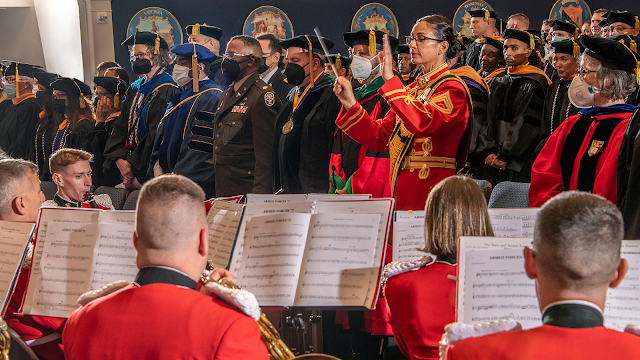USU Faculty Look Back on Graduate Student Accomplishments
By Ian Neligh
With graduation ceremonies recently finished, Uniformed Services University of the Health Sciences (USU) faculty members reflected on the many accomplishments of their graduate students in the Graduate Programs in Biomedical Sciences and Public Health.
The graduate program encompasses masters and doctoral degree students and is geared toward educating academic professionals. Students often pursue careers in biomedical research and public health practice working to support the nation through government or public sectors.
Department of Medical and Clinical Psychology at USU. “I mentored two Ph.D. students who are graduating this year. Both are off to highly competitive post-doctoral fellowships - one at the National Institutes of Health (NIH) and the other at Duke University… My hope is that they are happy and feel confident in their impressive abilities and talents.”Reflecting on some of the subjects that her graduates found exciting and interesting, Tanofsky-Kraff points to their appreciation of the biological and psychosocial underpinnings of eating and weight disorders so that targeted prevention efforts may be developed.
“This is likely because they gain insight into the range of aspects that interact to influence medical and psychological conditions,” Tanofsky-Kraff says.
According to Tanofsky-Kraff, one of the unique projects her students participated in was work on endophenotyping eating and weight disorders with their NIH collaborators, and how that work directly informed their development and testing of targeted therapies to prevent obesity and eating disorders at USU.
“This work is significant because it demonstrates how research can directly inform treatment,” Tanofsky-Kraff says. “… I am very proud of all our students and I feel fortunate to work with them and with the stellar faculty.”
Dr. George Liechti, an assistant professor in the Department of Microbiology and Immunology and lecturer in a number of graduate courses and medical student modules, says graduate and medical students are often interested in breakthrough advancements in the fields of antimicrobial discovery and antimicrobial resistance.
“These are very hot topics in clinical microbiology and a real concern for the broader medical community,” Liechti says, adding his first graduate student, Dr. Mary Brockett, who he worked with for five years was among the class that recently graduated. “Dr. Brockett was particularly interested in investigating how bacteria respond to stress, such as what occurs during an active immune response or treatment with antibiotics.”
Liechti says, due to her efforts, his laboratory published several peer-reviewed papers in various scientific journals and he obtained multi-year funding from the National Institute of General Medical Sciences (NIGMS).
“I am very proud of Dr. Brockett and I was very lucky to have her in my lab,” Liechti reflects.
Dr. Joseph McCabe, professor and Vice Chair for Faculty Affairs in the Department of Anatomy, Physiology, and Genetics, with secondary appointments in the Graduate Programs in Neuroscience and Cell and Molecular Biology, says he is tremendously proud each time he sees a graduating class off, knowing they’ll be contributing in a career to science and medicine.
“When they come (to USU) they really have to start from scratch. The first two years of the curriculum are primarily devoted to classroom time and some lab work. It’s critical for students during that time to come to their own ideas of what they want to do with their life,” McCabe says. “It’s almost a calling, if you will, as with everyone, but you’re always sensitive to it with graduate students — do they want to do animal research? Do they want to go into academia? Do they want to go into business? Do they want to do human research?”
McCabe says one thing he finds most impressive about his graduate school students is many of them go into something related to government service.
“Our neuroscience graduate students have a keen devotion to understanding the basic mechanisms and treatment approaches to brain trauma,” McCabe says. “…USU is nationally known in the traumatic brain injury community and this is a reason many students matriculate here.”
McCabe says he enjoys working with the graduate students, particularly in the lab where there are daily challenges to properly ask scientific questions and perform experiments that answer those questions. He notes that those graduate students, more often than not, go on to lead distinguished lives.
“Our graduates in Neuroscience have had astounding accomplishments in their careers, including leadership roles in government, academia, and private industry,” McCabe says. “I think all USU faculty have great pride in witnessing the progress and achievements of our students, and yes, it is exciting but with a bit of sensibility in seeing students move on.”







